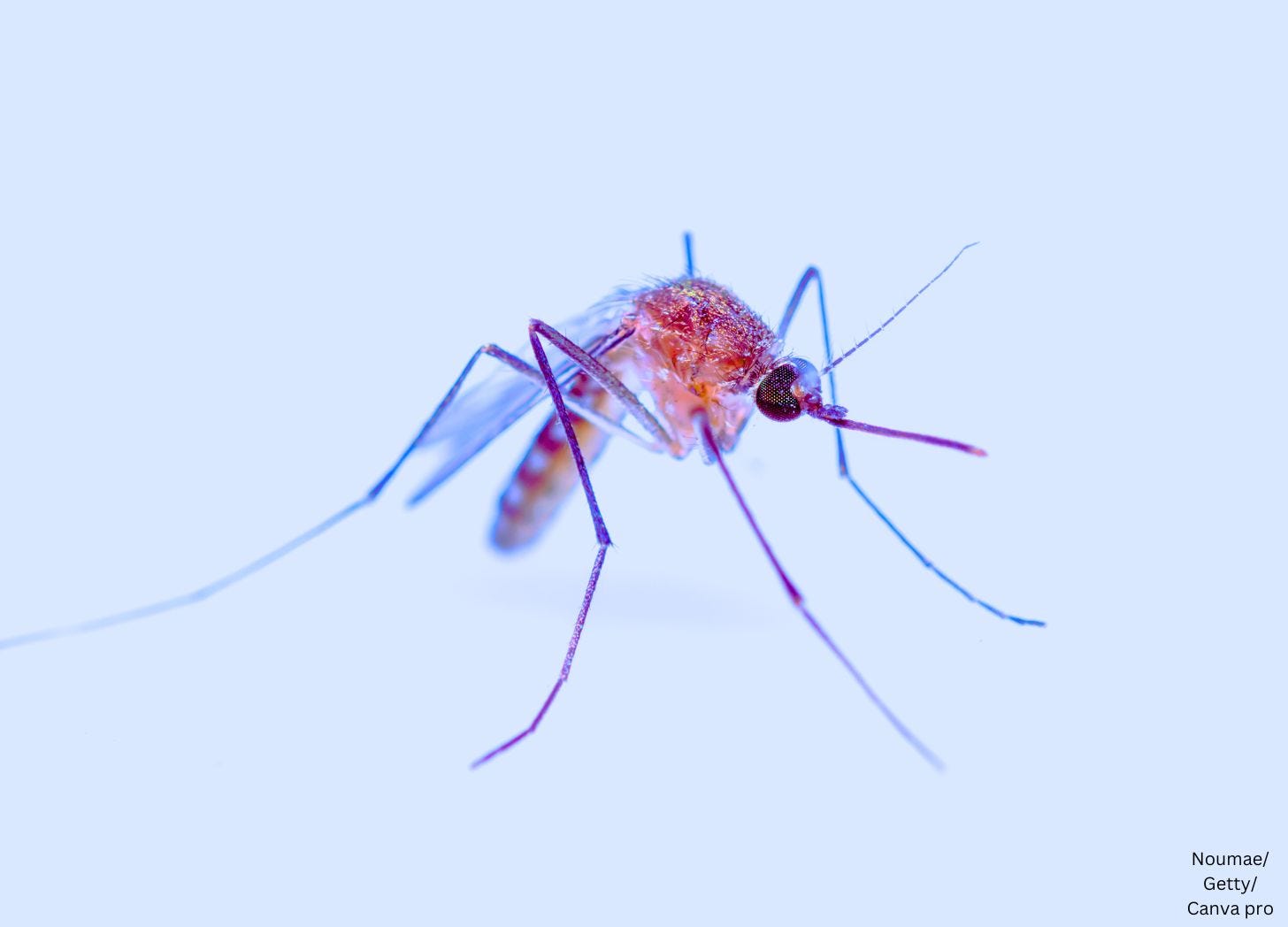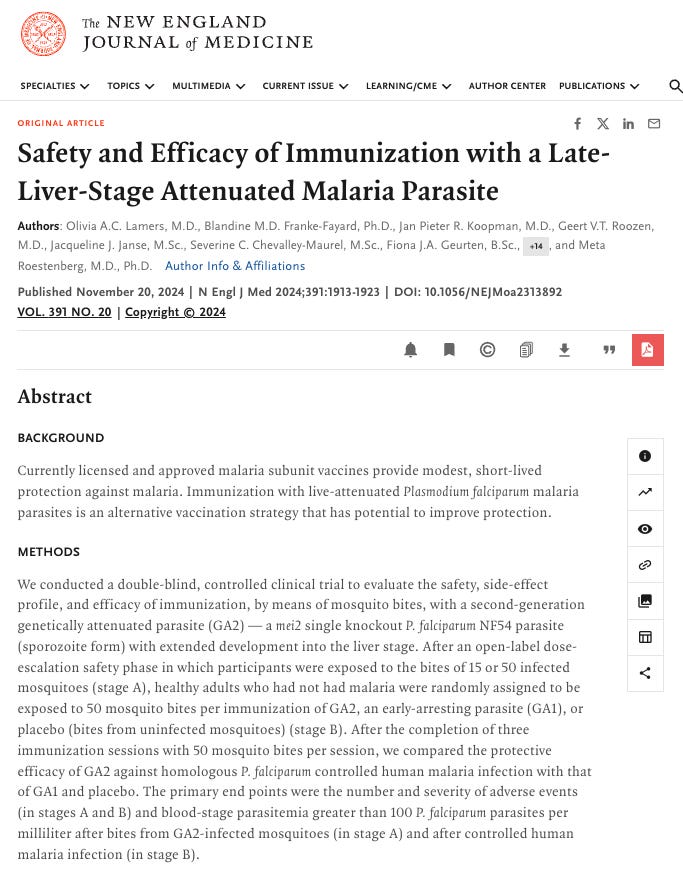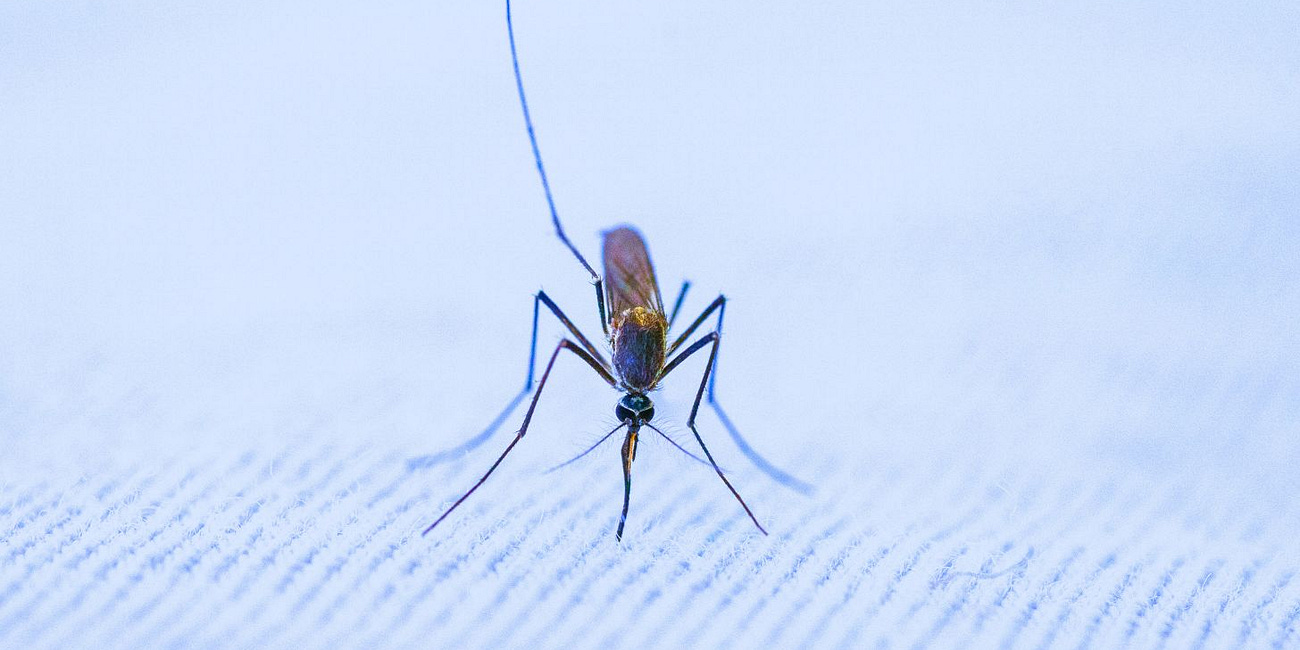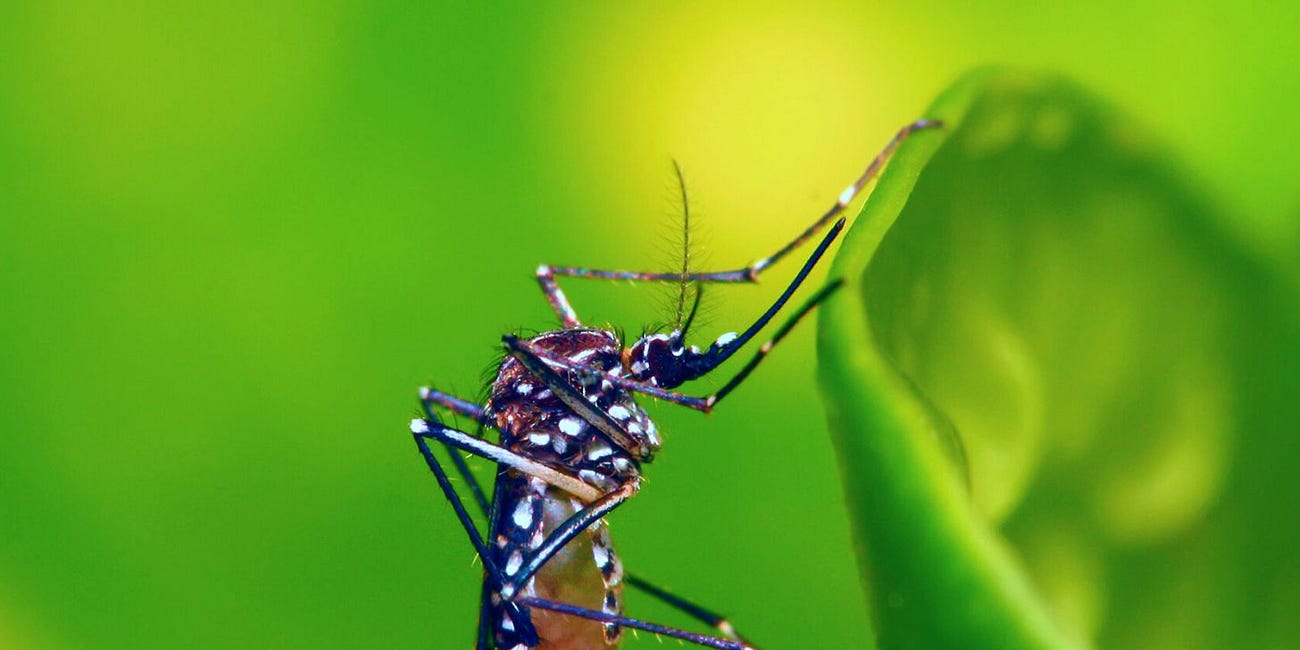Bill Gates-Tied Vaccine Delivered Through Bite of Mosquito That Carries Bioengineered Malaria-Causing Parasite That Infects Human Blood Cells: 'New England Journal of Medicine'
Bill Gates funds Dutch medical center that engineers mosquito-vaccines.
In a startling revelation, scientists have successfully created a mosquito that injects humans with a genetically engineered, malaria-casing parasite that travels to the liver where it infects red blood cells.
Follow Jon Fleetwood: Instagram @realjonfleetwood / Twitter @JonMFleetwood / Facebook @realjonfleetwood
The bizarre experiment details were published last month in the peer-reviewed New England Journal of Medicine (NEJM).
The study was conducted by researchers at the Leiden University Medical Center (LUMC) in Leiden, Netherlands.
The same month the study was published, The Bill & Melinda Gates Foundation gave $2,287,871 to LUMC to develop “next generation malaria vaccine candidates,” according to the Foundation’s website.
This was in addition to the $1,578,317 given by Gates to LUMC in September 2023 “to understand population and geographic factors affecting response to malaria vaccines in endemic countries.”
The study authors write: “We conducted a double-blind, controlled clinical trial to evaluate the safety, side-effect profile, and efficacy of immunization, by means of mosquito bites, with a second-generation genetically attenuated parasite (GA2) — a mei2 single knockout P. falciparum NF54 parasite (sporozoite form) with extended development into the liver stage.”
The Plasmodium falciparum (P. falciparum) parasite causes malaria in humans.
The study parasites had been “genetically attenuated,” meaning they were genetically modified, or engineered, purportedly to limit their lifecycle.
In one stage of the experiment (Stage A), study participants “were exposed to the bites of 15 or 50 infected mosquitoes.”
In Stage B, “healthy adults who had not had malaria were randomly assigned to be exposed to 50 mosquito bites per immunization of GA2, an early-arresting parasite (GA1), or placebo (bites from uninfected mosquitoes).”
These bioengineered mosquitos “travel to the liver and then infect red blood cells” in exposed participants, a Nature publication explained about the study.
The experiment involved two modified malaria parasites, one called GA1 and another called GA2.
GA1 was “designed to stop developing about 24 hours after infection in humans,” per Nature, but the GA1 parasite “protected only a few participants against malaria, leading the team to engineer a second parasite, GA2.”
GA2 was “designed to stop developing about six days post-infection, during the crucial period where the parasites replicate in human liver cells.”
Only one of eight (13%) participants bitten by GA1 parasites didn’t contract malaria, demonstrating weak effectiveness.
Protection was said to be 89% in the GA2 group.
But the study authors apparently only tracked infections for 25 days, meaning more infections could have occurred after that short tracking period.
Moreover, two participants (20%) in Stage B showed elevated troponin T levels (18 and 19 ng/mL), exceeding the normal limit of 14 ng/mL.
Troponin T is a well-known marker for heart muscle damage or stress, raising concerns about potential cardiac injury.
The study authors claim the elevated troponin levels were “unrelated to the trial intervention,” but without elaborating how they knew this.
Dr. Richard Bartlett, who has been outspoken on medical safety and ethical concerns in clinical trials, raised critical issues about the study:
“The study raises significant red flags,” Dr. Bartlett said. “Tracking participants for just a few weeks is completely inadequate to assess long-term safety or efficacy. We need at least 6 months to a year to properly monitor for parasite infections and evaluate potential complications. Where is the long-term safety data? Without it, we cannot account for late-onset issues or complications that might arise.”
Bartlett also questioned the study’s approach to participant safety: “The study fails to address complications and contraindications. What happens if participants have preexisting conditions or unforeseen interactions? These unanswered questions undermine the ability to make safe, informed decisions.”
In particular, Bartlett highlighted the study’s findings of elevated troponin levels in some participants. “Elevated troponin levels are highly concerning. Troponin is a specific marker for heart cell damage, not the liver. This points to potential cardiac injury, which was seemingly dismissed without proper investigation. This is a serious safety signal that cannot be ignored,” he explained.
Finally, Bartlett addressed the issue of informed consent: “Informed consent is only possible when participants are fully aware of the risks—short-term and long-term. Without robust safety data, this process lacks transparency and accountability. As physicians, it’s our responsibility to demand better safeguards before moving forward with such interventions.”
These comments underscore major ethical and scientific concerns about the study’s design and execution.
Some argue a moratorium on this type of research is not just necessary—it’s a matter of public safety and ethical responsibility.
Without long-term safety data and stricter oversight, we risk setting a dangerous precedent for future experiments that could have far-reaching consequences.
Especially in the aftermath of a COVID-19 pandemic that killed over a million Americans, which Congress, the Department of Energy, the FBI, and other intelligence agencies believe was caused by a man-made pathogen.
Follow Jon Fleetwood: Instagram @realjonfleetwood / Twitter @JonMFleetwood / Facebook @realjonfleetwood
NIH Funds Research Into Self-Disseminating Vaccines That Spread Like a Virus from Host to Host
In a startling revelation, the U.S. National Institutes of Health (NIH) has been funneling millions of American taxpayer dollars into self-spreading vaccine research for nearly a decade.
New 116-Page Stop-Gap Bill Hides Renewed Emergency Powers Extended to 2025
Summary: The shorter, 116-page version of the 1,547-page stop-gap spending bill unveiled Tuesday night includes provisions that quietly extend government emergency powers under the Public Health Service Act (PHSA) (here) to March 31, 2025. Notably, the bill does not specify what these sections entail—an alarming omission given the sweeping powers they g…
California Declares Bird Flu State of Emergency
California Governor Gavin Newsom today proclaimed a State of Emergency in response to H5N1 avian influenza “bird flu,” following dozens of reports from this website warning readers of a potentially incoming, orchestrated H5N1 avian influenza pandemic.
FDA 'Fast Tracks' 2 Combination COVID-19-Influenza Shots Containing Formaldehyde, Insect DNA, Toxic Detergent Banned in Europe: Bill Gates-Funded Manufacturer
The U.S. Food and Drug Administration has granted “Fast Track designation” for two Sanofi combination vaccine candidates for influenza an…
How to Ban Gain-of-Function in America: Repeal or Amend the 1989 'Biological Weapons Anti-Terrorism Act'
In order to ban gain-of-function experiments in the country, the United States must repeal or amend the ‘Biological Weapons Anti-Terrorism Act of 1989.’
'Toxic,' 'Hazardous,' 'Fatal' Mosquito Insecticide Sprayed Over New York, Massachusetts, New Hampshire Neighborhoods
New York and Massachusetts are spraying neighborhoods with deadly insecticides in response to reported mosquito-borne illnesses.
Spike in Mosquito-Borne Infections Follow Report Bill Gates-Linked Company to Release Mosquitos in Caribbean: Puerto Rico Declares Public Health Emergency
The U.S. territory of Puerto Rico and other nearby Caribbean islands have declared a public health emergency due to a spike in cases of dengue fever, a mosquito-borne viral illness characterized by high fever, rash, and muscle and joint pain.
Bill Gates Isn't the Largest Funder of His Global Vaccine Campaign—American Taxpayers Are
Though many believe globalist Bill Gates funds his international vaccination campaign himself, recent White House announcements reveal the American people are the largest financial backers of his Gavi vaccine agenda, contributing over $11.5 billion through taxpayer-funded government allocations.
FDA Greenlights New Bill Gates-Funded ARCT-2304 Self-Replicating samRNA 'Pandemic' H5N1 Bird Flu Jab
Arcturus Therapeutics, a company specializing in mRNA-based pharmaceuticals, quietly announced Monday that the U.S. Food and Drug Administration (FDA) has granted approval for its Investigational New Drug (IND) application for ARCT-2304, a self-amplifying mRNA (sa-mRNA) injection targeting the H5N1 avian influenza “bird flu” virus.


















Bill Gates called Covid (i.e. Omicron) a vaccine:
https://www.youtube.com/live/U70Q9WqbMFM?si=92-cPRLdN0qrr5Mw&t=431
He also funds self-spreading vaccine research:
https://pmc.ncbi.nlm.nih.gov/articles/PMC11298812/
Nuremberg 2.0, now!